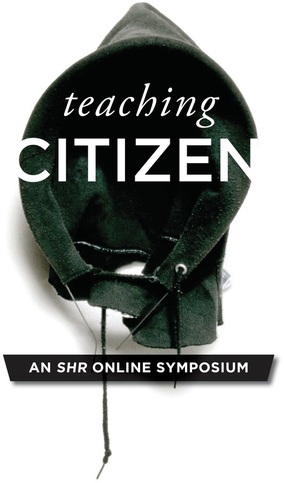|
Vertical Divider
The following is a response I wrote and read to the members of a graduate poetry workshop the week after a difficult—in none of the ways I'd anticipated—and disappointing—frustrating, confusing, insufficient—discussion of Citizen. FEELING
We failed. We failed to bring the power and insight and love and provocation of our truest attention to the text before us. To be sufficiently willing, open, brave. To actually wrestle with the embodied difficulties of such. Inadvertently or advertently, we silenced ourselves and each other. And by this silencing of ourselves, we inevitably silenced the text.
BELIEF
Failures are inevitable, often productive. Failures sometimes contain much of great meaning and importance. Failures are usually complex and collective. Failures may—and, I believe, in this case did—coexist with genuine best intentions. And so I use the word emotionally and on purpose to reflect something of the felt experience, but not to damn or to rebuke.
BELIEF
We are a community devoted to making and reading poems, to bringing our attention to language: how it is put together, how it makes something out of nothing, and how its somethings and its nothings resonate and reach—across the present and out into the future and back into the past. It is our calling, our responsibility, our privilege to read books of poems. It is our job.
BELIEF
There are no subjects or authors or methods or forms de facto not ours to read. Writing and reading are acts of empathy, imagination, invention, attempted and failed and imperfectly achieved communion. We accept that we only ever attempt. We believe it is better to try. Silence has a place—respect, contemplation, revelation, reflection, restraint—but not superimposed and regulated or born of segregation, predetermination, or censorship.
POSTULATION
Maybe in attempting to acknowledge potential difficulties I predicted or even encouraged them. Maybe in attempting to create a conscious space around the text I other-ed it and unwittingly limited or lamed the parameters of our conversation. Maybe in attempting to acknowledge the kind of blind spots we all have I unconsciously encouraged inhibition or self-consciousness.
POSTULATIONS
It was proposed that, due to our makeup, this was not our book to read. It was proposed that this was not a room in which the book should be discussed. It was proposed that fear of saying the wrong thing was adequate reason to say nothing. It was proposed that freight from outside the book/art form/room was adequate reason not to engage the book itself. To these propositions, with deep respect and at least some sense of the complexity and history they represent, I say no. No to any framing, the end result of which is to deny our engagement with poetry. No to us self-censoring our way into not really talking about a major, widely read, award-winning, powerful, beautifully crafted book, one written by a black woman who happens to be one of our leading contemporary poets.
FEELING
I was caught off guard. I anticipated a difficult conversation, challenging in entirely different ways. I failed to respond sufficiently in the moment, according to my own standards and my own beliefs.
BELIEF
Citizens. We are citizens of this room, of this and any work we take up as our collective text, of poetry and its discourse. We happen to be in this institution; we are and are not of it. We are a small collection of human beings brought together by chance or by fate—either way circuitously—and no matter what, we are a tiny sample of individuals existing in a sea of histories, buffeted by myriad cultural and historical currents. We do our best to represent ourselves. We share our experience: lived and learned and imagined and inherited. We are who we are, and we are where we are, no matter what we are discussing. We may not reject ourselves as a site for discourse selectively. We must follow through on the logic explicit or implicit to our propositions.
QUESTIONS
Is what we may discuss defined by the ethnicities or orientations of who is in the room? Are we then not to read poems that represent identities (of authors or voices/characters) not “represented” in the room? How would having a “representative” alter our right to read and our practice of discussing? What about experience? Rape, loss of a child, grave illness, immigration? What about I’m not a fill-in-the-blank, so no thanks, no can do?
BELIEF
I believe art speaks to us differently and is made sometimes with particular audiences in mind. In most cases, I don’t believe it is necessarily limited by or to those conditions. We have absences, deficits, inheritances, and present-day enactments that cannot and should not be ignored. But to turn away, especially from a work such as Citizen, is not the way to address them. Any way by which we arrive at a refusal to engage with this text—a major new book of contemporary poetry, a book by an award wining poet, a book by a woman of color about race/America/conversation—is a contorted outcome, an outcome to reject. Further, I don’t believe Citizen was written for or not for certain audiences. I think it explicitly engages, interrogates, implicates, and invites the subjectivity of myriad readers, and this is a core part of its work, its power.
FEELING-BELIEF
I do not believe there are black poems or white poems, gay poems or straight poems, men’s poems or women’s poems. Not, at least, in the sense of their readership. This doesn’t dismiss the profoundly different ways we may hear a poem speak to or for or even against us. This doesn’t dismiss the pervasive and pernicious reality that so-called minority populations are silenced explicitly and implicitly in myriad ways. To read is not to silence. To engage a text—as makers of poems, as dedicated readers of poetry, as students whose current and maybe future work is to read and to write poetry—should be the opposite of silencing, should be our best ever-imperfect way of honoring: the poems, poetry, the poet, ourselves.
BELIEF
All aspects and iterations of our art and its history are ours to know and to discuss, not to co-opt or to blindly reify. To explore, examine, own, disown. To know. Anything less is anti-art. I am anti-anti-art.
|
|
CURRENT ISSUE
|
CONTACT
|
DEPARTMENT OF ENGLISH
|



